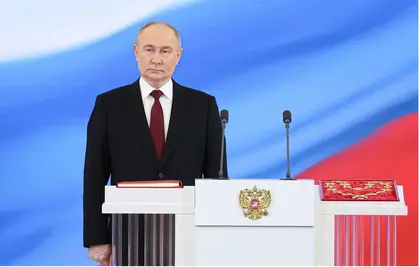Unlike in the West, where politicians tend to publish their aims if they are elected as a manifesto before the election, Putin’s Russia does so after the event by way of an Executive Order or decree. This year’s offering has the title: “On the National Development Goals of the Russian Federation until 2030 and for a Longer Term until 2036.” It replaces the 2020 version and consists of 11 paragraphs and many sub-paragraphs which lay out the President’s specific goals and targets that came into force on the day it was signed.
But don’t worry, I’m not going to go through it line-by-line, but just pick out some of the highlights and comment on their veracity. If you’re really interested, you can find the full text in the original Russian here or a (Google) translation here.
JOIN US ON TELEGRAM
Follow our coverage of the war on the @Kyivpost_official.
Paragraph 1
This consists of seven sub-paragraphs that summarize the contents of the document – the Russian Federation’s national goals until 2030 and for the future until 2036.
Paragraph 2
This sets out how Russia will go about “Preserving the population, strengthening the health, improving the well-being of people, and supporting the family.” It sets out percentage targets to increase the country’s fertility rate, encourage families to have three or more children and to increase life expectancy from the current 73.4 years to 78 by 2030 and to 81 by 2036.

Drones Strike High-Rise Buildings in Russia’s Kazan
Comment: Independent demographer Alexei Raksha is quoted by Bloomberg as having pointed out that Putin’s targets are “unrealistic without stopping the war and sharply tightening the screws on strong alcohol and cigarettes, as well as doubling healthcare spending.”
The decree also says it will increase the numbers of elderly and disabled citizens receiving social support, improve medical and rehabilitation support to participants of the “special military operation,” reduce levels of poverty, increase salaries for public employees, and introduce a new minimum wage.
Paragraph 3
Outlines how to “Realize the potential of every person, development of their talents, education to produce patriotic and socially responsible individuals;” again laying down numerical and percentage targets for a host of “initiatives” without detailing how they will be achieved or assessed.
Paragraph 4
This defines what Putin says are Russia’s aims to provide a “comfortable and safe living environment” for all citizens to include updating housing stock, infrastructure, transportation, public and historic amenities, and to provide each individual with 33 square meters of living space by 2030 and 38 square meters by 2036.
Satirical cartoon lampooning the 33 square meter announcement.
Comment: The independent news site Insider cites the current legislation which already lists the individual legal entitlement as 33 square meters but reduced to 42, for a couple and then an additional 18 for each family member. It points out that in some of the regions of Russia the individual allocation is currently only 18 square meters plus an additional 6 square meters per family member and asks where the extra space is going to come from.
Included under this paragraph is another restatement of Putin’s earlier aviation pronouncements that by 2030 at least half of the commercial airlines’ fleets should be provided from domestic production, which means more than 600 aircraft will need to be built in the next 6 years.
Comment: In the first half of 2023, factories only completed the construction of two civil aircraft for customers which were delivered months behind schedule. Shortages of key components caused by sanctions prevented production of major items particularly affecting new engine deliveries, which were unable to pass flight acceptance tests.
Paragraph 5
This lays down how Russia would ensure future “Environmental Well-Being,” laying down targets and percentages for reducing, sorting and recycling waste, reducing industrial emissions, hazardous waste, water pollution and preserving nature.
Paragraph 6
Lists the requirements for establishing a “sustainable and dynamic economy,” including “ambitious” targets for improving GDP, reducing imports, increasing investment, improving salaries and pensions, “robotization,” vocational training, tourism, and so on.
Paragraph 7
Lays down how Putin wants to rise to one of the top ten global powers in terms of “Technological Leadership,” through investment in scientific areas including automation, space and nuclear technology, bio-economics and chemical industries and expanding R&D in every field.
Paragraph 8
Sets targets for the “Digital transformation of state and municipal government, economy and social sphere,” including medicine, education, machine learning and artificial intelligence. It also sees the need to improve access to high-speed broadband access, the internet, satellite, and mobile communications, replacing 80 percent of externally produced software with domestic versions.
Comment: The last aspiration is one that has effectively been forced upon Russia as the major software providers such as Microsoft have withdrawn in parallel with the imposition of sanctions.
Paragraphs 9 -11
These largely involve the legal and procedural elements of publishing and implementing the President’s decree.
Many of the targets in the 2024 decree are similar and in a lot of cases almost exactly the same as those in the 2018 version. Needless to say, very few of them have come anywhere near to being achieved, many being thrust aside by the 2022 invasion of Ukraine. There is little to suggest there will be an improvement over the next 6 or 12 years.
The views expressed in this opinion article are the author’s and not necessarily those of Kyiv Post.
You can also highlight the text and press Ctrl + Enter







